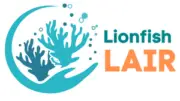Yes, guppies do eat and enjoy eating algae, which is tremendously beneficial for your aquarium. Typically in the wild, algae is a huge part of guppies' diet, as well as fry, insects, and invertebrates. They will most certainly be on the hunt for algae as soon as they enter your tank, which helps control outbreaks and the bacteria in your fish tank.
Here's a video summarizing this article:
What Type of Algae do Guppies Eat?
Fortunately, guppies eat many different types of algae - they are far from fussy eaters! This is great as algae tend to appear in many different variations. Let's run through the algae that guppies enjoy snacking on.
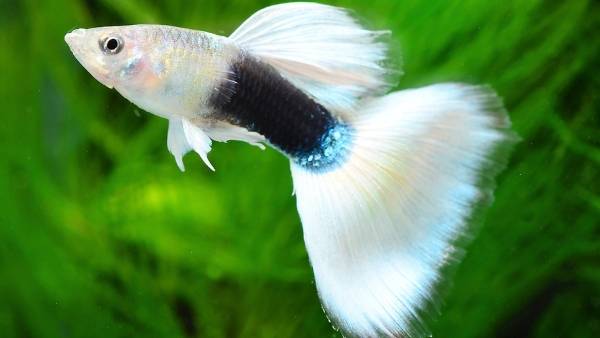
Do Guppies Eat Hair Algae?
Guppies certainly do eat hair algae, which typically grows on gravel, rocks, plants, and aquarium decorations. Hair algae are pretty stubborn and hard to remove, which is why it is brilliant that guppies eat them, relieving the hobbyist of extra work.
Do Guppies Eat Staghorn Algae?
Staghorn algae are eaten by guppies willingly, being one of their favorite algae species to consume. This algae usually grows on aquarium decor, equipment, plant leaves, and even live rock, causing quite the nuisance. Not to mention they are difficult to manually remove too.
Do Guppies Eat Brown Algae?
Brown algae are another algae species that is happily consumed by guppies. The algae tend to be soft and do not stick onto surfaces particularly firmly, making them easy to clean and easy to eat for guppies.
The one negative with brown algae is that it is really susceptible to blooming and spiking in numbers at an incredibly quick rate. If you discover vast amounts of brown algae, you may want to add some more algae eaters to your tank to help relieve the problem.
Do Guppies Eat Black Beard Algae?
Guppies love consuming black beard algae, making your life easier should you experience an outbreak. Black beard algae are usually formed in dense clumps which are hard to remove manually, but not for hungry guppies!
Can Guppies Eat Blue-Green Algae?
No, blue-green algae contain many poisonous toxins which are incredibly harmful to guppies. If you have spikes of blue-green algae in your guppy fish tank, make sure to manually remove it so that your guppies do not try to.
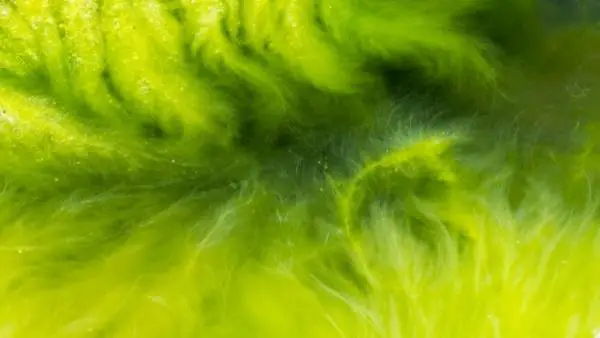
Do Guppies Eat Algae Wafers?
Algae wafers are typically for the consumption of bottom-dwelling fish species, which might not get enough algae from their environment. So, if your guppy is not getting enough algae naturally, it wouldn't hurt to add some algae wafers to their already balanced diet. A balanced diet for guppies is a combination of live and frozen foods, packed with meats and vegetabes.
Is Algae Healthy for Guppies?
Consuming algae, unless blue-green algae or certain types of diatoms, is pretty healthy for guppies and also adds some variation and balance to their diet. When in the wild, guppies will consume a lot of algae as it is an easy and readily available food source, with good nutritional content.
Algae contains protein, amino acids, taurine, pigments, and lipids, along with many other nutrients. Guppy fry will benefit massively from consuming algae, not only is it small enough for them to eat, but it contains the perfect amount of protein and other nutrients for their growth.
Can Guppies Eat Only Algae?
Guppies will not survive by only eating algae. Guppies need a well-rounded diet containing a mixture of different food types and nutrients. Sure, it might be possible for your guppy to sustain itself for a while only consuming algae, but it will not be healthy or happy.
Your guppy requires iron, calcium, phosphorus, magnesium, zinc, iodine, and most other nutrients, which cannot all be found in algae. Algae certainly are nutritious, however, they do not contain all the nutrients guppies need as part of their overall diet.
What Other Foods Do Guppies Need To Eat?
So, we know that guppies can eat algae, but not only algae, they must eat other nutrient-rich foods to maintain a balanced and healthy diet, but which foods? Guppies are omnivores and will literally eat anything put in front of them, but it is certainly best to feed them microorganisms, crustaceans, pellets, flakes, and meaty foods. Some good suggestions in terms of live food are shrimp and bloodworms.
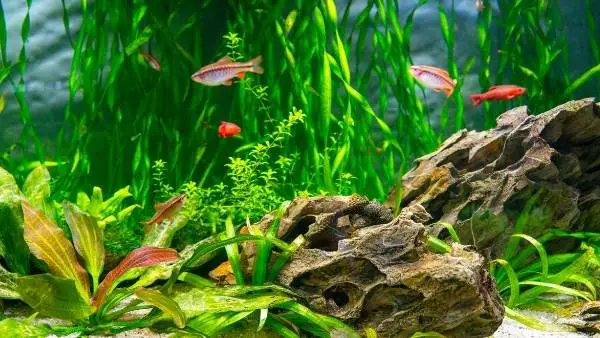
Can Guppies Eat Bloodworms?
Guppies enjoy consuming bloodworms, but it is best to feed them freeze-dried bloodworms, making sure you do not feed them too many as they have a seriously high concentration of protein.
Overconsumption of bloodworms can result in a bloated or constipated guppy. Frozen bloodworms and brine shrimp are still brilliant additions to your guppy's diet and will help improve their coloration too, making them brighter and more beautiful as long as they are fed in moderation.
Can Guppies Eat Vegetables?
Yes, indeed, guppies enjoy many different types of vegetables, with the more notable being cauliflower, carrots, cabbage, and broccoli, but they will accept pretty much any vegetable you can get your hands on.
Just make sure you do not overfeed them or add seasoning to the veggies. To make them more digestible too, it is advised to steam and soften the vegetables up.
Can Guppies Eat Flakes and Pellet Foods?
Guppies can and certainly should be eating flakes and pellet foods. It provides them with a balanced and consistent diet. Just make sure that you purchase guppy food that is specifically compatible for them.
By acquiring specific guppy food you are providing your guppies with tailor-made foods that are designed to give your guppies all the nutrients their bodies require. If you cannot find any guppy food, try tropical fish formula, but make sure it is guppy-friendly.
Can Guppies Control Aquarium Algae?
Typically no. Guppies will eat many different types of algae and can control it to a certain degree, but they will not completely rid your tank of the stuff. They cannot eat algae fast enough and they are simply not big enough to consume enough algae if you have a breakout in your tank.
If you only have a small outbreak, with a thin layer of algae running across a surface, then your guppies should make light work of it. But if you have a fast-growing algae colony, you cannot expect your guppies to out-eat the growth rate of the algae.
Can you have algae eaters with guppies?
Absolutely yes, you can have algae eating fish in the same tank as guppies. The following list contains the best algae eaters to live with your guppies.
- Chinese Algae Eater
- Siamese Algae Eater
- Bristlenose Pleco
- Otocinclus Catfish
Of course, there are other brilliant algae eaters in the form of shrimp and snails, but our list just contains fish. Moreover, it is not the responsibility of your marine community to remove the algae in your tank, it is solely the hobbyists. Algae eaters will do a great job, but you should also acquire the correct equipment, and handle the algae problem yourself by using an algae scraper or something similar.
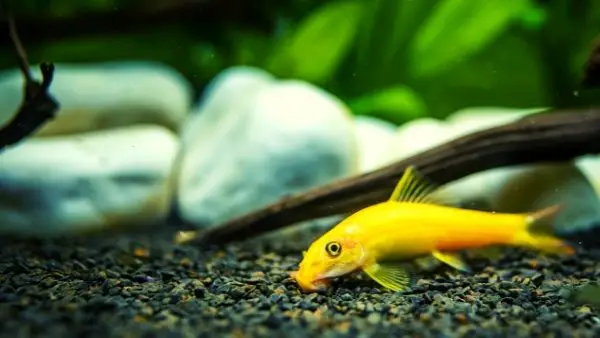
Does Excessive Algae Growth Affect Guppies?
There are many benefits to having algae in your fish tank, however, there are many negatives too, and this is certainly the case with guppy fish tanks. Algae typically produce more oxygen than they consume, whilst they break down carbon dioxide and nitrogen compounds into sugar and oxygen.
The problem for many when it comes to algae is that it is hardly a nice sight to have your aquarium coated in an unattractive green color. In addition to this, algae will likely consume the majority of your tank's nutrients and oxygen, especially during outbreaks. Too much algae will most likely starve the rest of your tank from their required nutrients, which can be harmful and deadly for your guppies!
How Do Guppies Contribute to Algae Growth?
Guppies most definitely do contribute to the growth of algae, as well as help reduce the numbers. It sounds a bit contradictory, but hear us out. Algae growth is certainly sped up by their food consumption, and algae typically diet on waste produced by guppies and other fish.
Guppies do tend to help with algae growth more than other fish due to their excessive eating and their overproduction of body waste. The food waste residing in your tank will be the primary food source for algae, providing them with the required nutrients. Overfeeding your fish will certainly lead to excessive algae growth as well as a poor filtration system. So, make sure you keep on top of things!
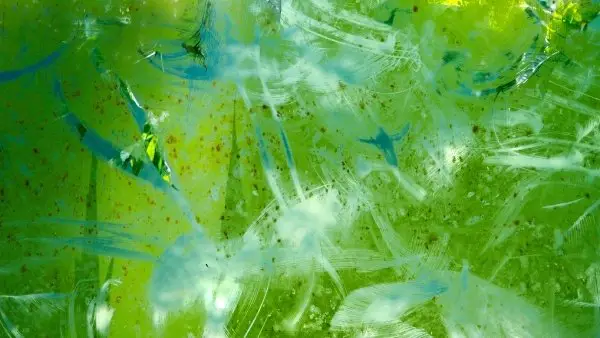
Conclusion
Guppies enjoy eating almost everything put in front of them, which is why it is so crucial that you do not allow them to just feed on algae or bloodworms. You should provide them with a balanced and nutritional diet, helping them grow healthy and happy. They will make for brilliant algae eaters, but do not expect them to fix any algae breakouts you are experiencing - they are only little!
